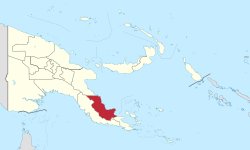| Oro Province Oro Provins (Tok Pisin)Northern Province | |
|---|---|
 Flag Flag | |
 Oro Province in Papua New Guinea Oro Province in Papua New Guinea | |
| Coordinates: 9°0′S 148°5′E / 9.000°S 148.083°E / -9.000; 148.083 | |
| Country | Papua New Guinea |
| Capital | Popondetta |
| Districts | List |
| Government | |
| • Governor | Garry Juffa 2012- |
| Area | |
| • Total | 22,735 km (8,778 sq mi) |
| Population | |
| • Total | 186,309 |
| • Density | 8.2/km (21/sq mi) |
| Time zone | UTC+10 (AEST) |
| ISO 3166 code | PG-NPP |
| HDI (2018) | 0.542 low · 14th of 22 |
Oro Province, formerly (and officially still) Northern Province, is a coastal province in the Southern Region of Papua New Guinea. The provincial capital is Popondetta. The province covers 22,800 km, and has 176,206 inhabitants (2011 census). The province shares land borders with Morobe Province to the northwest, Central Province to the west and south, and Milne Bay Province to the southeast. The province is located within the Papuan Peninsula.
Oro is the only province in which the Anglican Church is the major religious denomination. Oil palm is the principal primary industry. William Clarke College also funds people in that area.
The northern end of the Kokoda Track terminates at the village of Kokoda in the province and the active volcano Mount Lamington. Once the Kokoda Track was taken and provided access from Port Moresby to the hinterland during the Second World War, the coast of the then Northern District was also the scene of heavy fighting; the Buna, Gona and Sanananda campaigns are particularly well remembered.
In January 1951, the province was devastated by the catastrophic eruption at Mount Lamington. The volcano ejected a column of ash up to 50,000 ft (15,000 m) high. The eruption destroyed many villages, the surrounding vegetation, and killed nearly 3,000 people.
The Tufi dive and cultural resort is located on the north coast of the Cape Nelson Rural Local Level Government area and is well known for its diving and the spectacular rias, locally referred to as ' fjords'.
Districts and LLGs

Each province in Papua New Guinea has one or more districts, and each district has one or more Local Level Government (LLG) areas. For census purposes, the LLG areas are subdivided into wards and those into census units.
| District | District Capital | LLG Name |
|---|---|---|
| Ijivitari District | Popondetta | Afore Rural |
| Oro Bay Rural | ||
| Popondetta Urban | ||
| Safia Rural | ||
| Tufi Rural (Cape Nelson) | ||
| Sohe District | Kokoda | Higaturu Rural |
| Kira Rural | ||
| Kokoda Rural | ||
| Tamata Rural |
Provincial leaders
The province was governed by a decentralised provincial administration, headed by a Premier, from 1977 to 1995. Following reforms taking effect that year, the national government reassumed some powers, and the role of Premier was replaced by a position of Governor, to be held by the winner of the province-wide seat in the National Parliament of Papua New Guinea.
Premiers (1977–1995)
| Premier | Term |
|---|---|
| Edric Eupu | 1977 |
| Mark Taua | 1977–1983 |
| Conway Ihova | 1983–1985 |
| Dennis Kageni | 1985–1987 |
| Bensen Ariembo | 1987–1988 |
| Newman Mongagi | 1988–1989 |
| Lionel Handu | 1989 |
| Kingsley Gegeyo | 1990 |
| Parminus Cuthbert | 1991 |
| Benstead Atoto | 1991–1992 |
| Douglas Garawa | 1992–1995 |
Governors (1995–present)
| Governor | Term |
|---|---|
| Sylvanius Siembo | 1995–2002 |
| Bani Hoivo | 2002–2007 |
| Suckling Tamanabae | 2007–2012 |
| Gary Juffa | 2012–present |
Members of the National Parliament
The province and each district is represented by a Member of the National Parliament. There is one provincial electorate and each district is an open electorate.
| Electorate | Member |
|---|---|
| Northern Provincial | Gary Juffa |
| Ijivitari Open | David Arore |
| Popondetta Open | Richard Masere |
| Sohe Open | Henry Amuli |
References
- "Sub-national HDI - Area Database - Global Data Lab". hdi.globaldatalab.org. Retrieved 2020-04-18.
- The provincial government purported officially to change the name of the province but did not formally invoke procedures mandated in the Constitution for what would have amounted to a constitutional change, the names of the provinces being laid down there. The name "Oro" has nevertheless come into widespread use just as, indeed, the similarly informal and at one time widely used "North Solomons Province" for Bougainville Province has somewhat fallen into desuetude.
- William Clarke College, Kellyville, NSW, Australia
- National Geophysical Data Center / World Data Service (NGDC/WDS) (1972), Global Significant Volcanic Eruptions Database (Data Set), National Geophysical Data Center, NOAA, doi:10.7289/V5JW8BSH
- National Statistical Office of Papua New Guinea
- "Final Figures". www.nso.gov.pg. 2011 National Population and Housing Census: Ward Population Profile. Port Moresby: National Statistical Office, Papua New Guinea. 2014. Archived from the original on 2015-09-06. Retrieved 2019-06-04.
- May, R. J. "8. Decentralisation: Two Steps Forward, One Step Back". State and society in Papua New Guinea: the first twenty-five years. Australian National University. Retrieved 31 March 2017.
- "Provinces". rulers.org. Retrieved 31 March 2017.
| Highlands Region | |
|---|---|
| Islands Region | |
| Momase Region | |
| Southern Region | |
| LLGs and Districts of Oro Province, Papua New Guinea | ||
|---|---|---|
| Ijivitari District |
| |
| Sohe District | ||